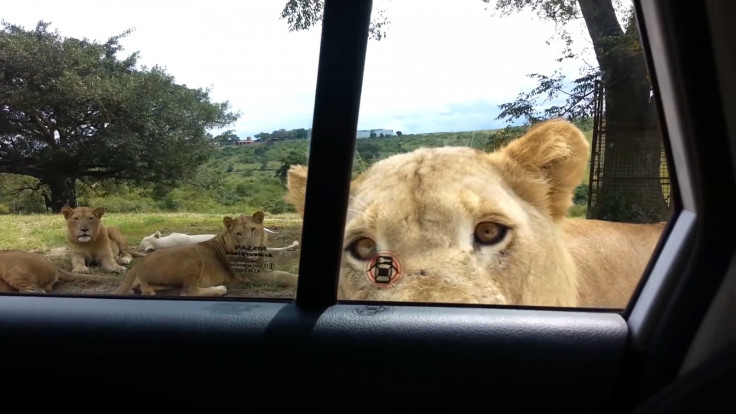South Africa: Lion drags American woman from car and kills her at Lion Park near Johannesburg

An American woman was killed and another person injured by a lion that jumped into their car at Lion Park near Johannesburg, South Africa on Monday (1 June).
The woman was in the passenger seat and had her window down when the attack occurred. The driver tried to help her and was injured in the process.
Scott Simpson, assistant operations manager at Lion Park, confirmed on eNews Channel Africa (eNCA) that the tourists were driving with their windows open.
"Our staff working at the top of the camp tried to get the lion away from the car. Ambulances were called immediately but it was too late," he said.
Simpson added that the park puts a lot of effort into warning visitors to keep windows shut.
"We make it so clear. We put signage up everywhere that people must keep their windows closed. We hand them a slip of paper when they enter the park. I really don't understand why people think it's OK to leave windows open," he said.
In March, Brendan Smith, an Australian visitor to the same park, was also attacked by a lion that entered his vehicle through an open car window, but he survived.
eNCA also reported that two days later a 13-year-old boy on a bicycle, who was taking a shortcut through the park, was attacked by a cheetah.
Although Simpson confirmed the woman's nationality as American, the US embassy in South Africa said it was waiting for details and added that it was working to "provide any assistance possible".
The Ghost and the Darkness
Meanwhile, the descendants of the Tsavo Man-Eaters lions have emerged from the African Bush to strike terror in workers replacing the Kenya-Uganda Railway.
In 1898, the notorious Tsavo Man-Eaters – a pair of lions with a taste for human flesh – killed dozens of Indian workers who built the British Kenya-Uganda Railway, before they were shot by a British colonial officer.
Now their descendants in Kenya are attacking workers laying the £2.5bn replacement of the rail line by the Chinese.
According to the Kenya Wildlife Service (KWS), a ranger was attacked and badly injured by a lion last week, whilst he was guarding an area near the construction of the new railway line. The area was to be visited by the Kenyan President, Uhuru Kenyatta.
Earlier this year, KWS had urged workers building the new standard gauge railway to take extra care in the evening, so as to avoid being prey for Tsavo's lions.
KWS assistant director Robert Obrein was reported to have told workers in the area: "(The Company's) camp is in the area where the notorious man-eating lions that were responsible for the deaths of a number of workers who built the Kenya-Uganda railway in 1898 roamed. It is also near Tsavo River where other big cats such as cheetahs and leopards come to drink water."
The Lions of Tsavo became famous in 1898 when a team of Indian builders were attacked by two lions while building a bridge over the River Tsavo.
The two lions went on a rampage for a number of months, and were estimated to have killed 135 workers.
The person in charge of the construction, Lt. Col. Patterson, finally killed the two lions in December 1898, a good ten months after they started their killing spree.

The lions' rampage lasted 10 months, and they were estimated to have killed 135 workers. Workers built barricades made of thorn fences to keep the man-eating lions out of their camps, but the big cats leapt over the barricades or dragged themselves – and the prey back out – through the thorns.
The lions have featured in a number of films, the most notable being The Ghost And The Darkness, starring Michael Douglas and Val Kilmer.
Many theories have been put forward as to why the lions became man-eaters, including the burial customs of the Hindu workers who cremated their dead in the open, leaving the corpses to be scavenged by the lions.
Historians have also highlighted the ancient Arab slaving caravans that traversed the remote Tsavo region, dumping the dead where they fell as encouraging lions to eat human flesh.
African lions are estimated to attack around 70 humans per year in Tanzania, and kill up to 250 people a year. However, lions are relatively peaceful compared to hippos: despite their cuddly reputation hippopotamus kill nearly 3,000 people a year in Africa.
© Copyright IBTimes 2025. All rights reserved.






















